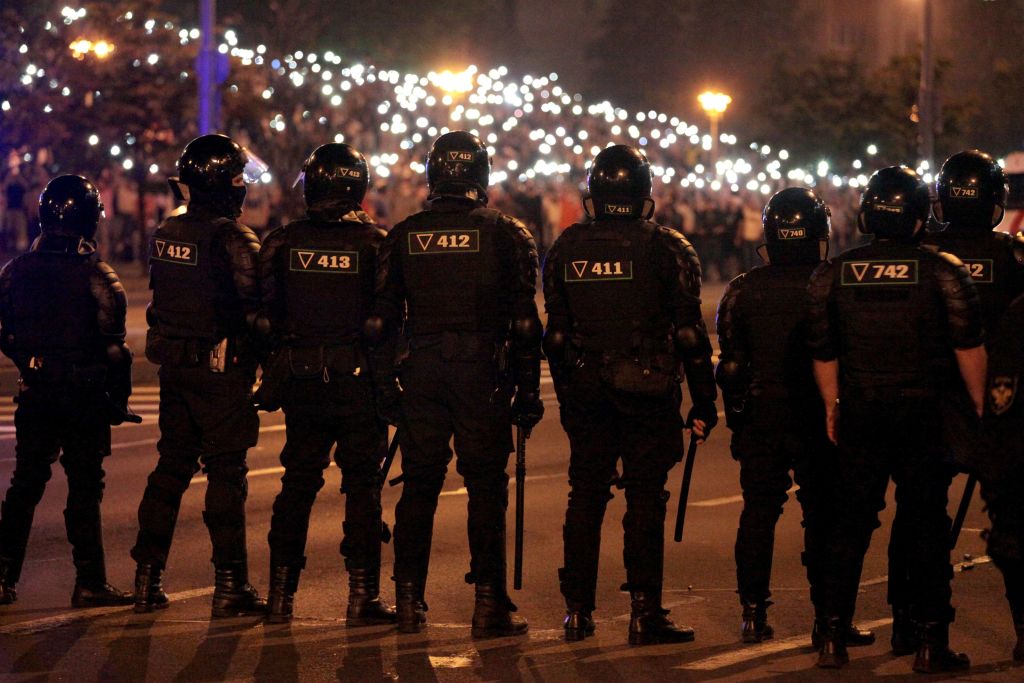It’s hard to believe Belarus’s Alexander Lukashenko will retain his half-affectionate, half-exasperated nickname ‘Batka’ (Dad) after his re-election this weekend in a presidential vote rigged beyond the point of farce, which led to violent street protests across the country. Despite claims he had fled the country, the ‘last dictator in Europe’ made it through the night — but his regime is now nearing its end.
Lukashenko has been more-or-less firmly ensconced in Belarus since 1994, and under his rule the country has remained a strange Soviet-capitalist hybrid. There are still streets named after Marx, the political security police are still called the KGB, and large state enterprises still dominate much of the economy, but there are pockets of thriving entrepreneurism.
His personal control of the country has been based on the classic tools of the dictator: loyal and extensive security forces, an elite with more to gain from his survival than his departure, and a population offered stability in return for docility — with no prospect of success if they resist.
This helps explain his seemingly-foolhardy decision not just to rig the elections, but to do so in a spectacularly blatant way this weekend. Lukashenko only had one true rival in this election: Svetlana Tikhanovskaya, a 37-year-old who decided to stand when her husband, Sergei Tikhanovsky, was arrested for running against Lukashenko. Svetlana had no political experience and no manifesto beyond ousting Batka and holding a new, free and fair election. Nonetheless, she proved an unexpectedly popular candidate, whose poise, courage and message resonated with a population which has had enough.
Tikhanovskaya’s success wasn’t just down to ennui with a president whose time seemed long over, though that was part of it. It wasn’t merely that Lukashenko’s promises to double average income in five years rang false to a population whose real wages had been falling for years, although that didn’t help. It wasn’t just his perverse and ineffective response to COVID-19 either — he infamously asserted that vodka, saunas and driving tractors kept it at bay — though that undoubtedly contributed.
На этих кадрах хорошо видно, как милиция, как она заявляет, «не применяет» водометы и светошумовые гранаты. Собрали главное за этот вечер из Беларуси pic.twitter.com/8a8QSkEw94
— Дождь (@tvrain) August 9, 2020
It was, rather, that there seemed to be a chance for things to change. The 65-year-old Lukashenko looked less confident during this election, and visibly uncomfortable at times. His claims that ‘foreign forces’ were behind the political opposition — followed by the arrest of 33 Russian mercenaries, apparently in transit to Africa as the alleged spearhead of some nefarious plot — were counter-productively outlandish.
The greatest threat to any dictatorship is hope and Tikhanovskaya’s barnstorming campaign, alongside signs of dismay and division within the regime, allowed the people of Belarus to imagine a future without Lukashenko.
In response, the dictator had to go all out. Minsk was virtually turned into an armed camp as riot police and army units were drafted in from across the country. After a day of intense and evident electoral rigging, with independent observers denied access, votes counted in secret and government employees bussed in to cast their ballots to order, it was announced that Lukashenko had not just won the election, but triumphed with an 80 percent vote share to Tikhanovskaya’s 9.9 percent.
This is, of course, nonsense. It may even be the direct opposite of the real result. But this was Lukashenko’s last wager and he needed to go all in: he had to appear in such a powerful position that he could treat the election — and thus, by extension, the electorate — with contempt and still get away with it.
The scale of the violence at the protests on Sunday night was perhaps predictable. The question now is what happens the day and the week after. If the demonstrations can be contained, if the security forces stay loyal and if the elite remains united, then Lukashenko will probably hold on for now. This is just delaying the inevitable, though. He cannot regain his legitimacy, and a throne of bayonets is not only uncomfortable, it leaves the monarch dependent on those who wield them. Politically, Lukashenko is a dead man walking.
[special_offer]
This will pose an international challenge. Moscow has no desire to annex Belarus — not least, it is a handy transit point for dirty money laundered westwards, and sanctioned luxuries smuggled east — and regards a weakened but still surviving Lukashenko as its best option. What it cannot and will not accept is another of what it considers its ‘Near Abroad’ satellite states being lost to the West.
Meanwhile, the European Union will condemn the violence and the fraud, but how far will it impose serious sanctions and otherwise try to bring Lukashenko down? Already this morning I’ve received an email from a contact at the EU’s External Action Service suspecting that his colleagues, while loudly condemning the repression, are crossing their fingers that Lukashenko will be able to regain control, so that they are not forced to address this dilemma.
But some day they will: Batka’s days are over.
This article was originally published onThe Spectator’s UK website.


















